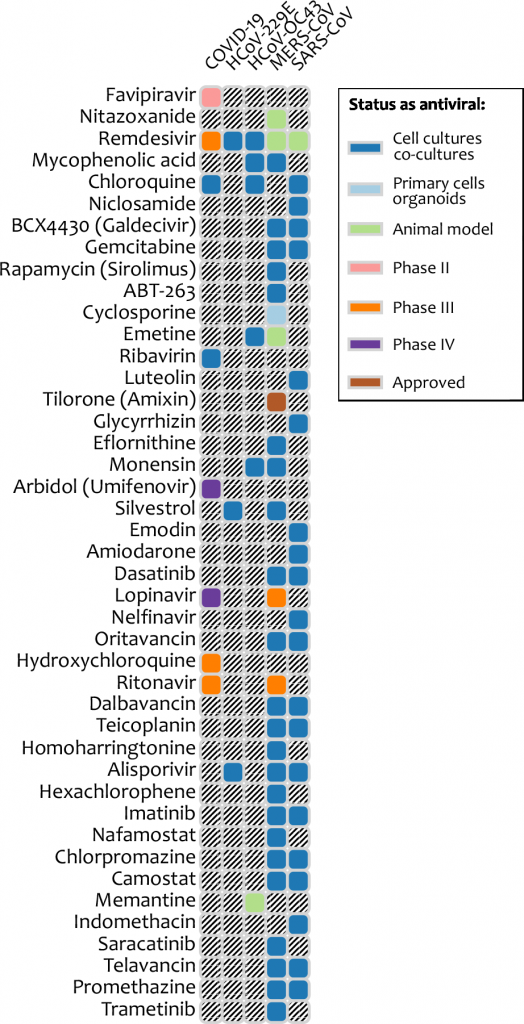BREAKING! Coronavirus Drug Research: Repurposing Existing Pharmaceuticals With Broad Spectrum Antiviral Properties Helps During Pandemic
Source: Coronavirus Drug Research Mar 01, 2020 5 years, 11 months, 3 days, 1 hour, 33 minutes ago
Latest Coronavirus Drug Research reveals that 31 existing drugs have been identified as prospective candidates to target the new coronavirus Including Teicoplanin, Oritavancin, Dalbavancin, and Monensin.
A coalition of European researchers based on a new collaborative study, are proposing that repurposing certain existing
drugs that demonstrate broad spectrum
antiviral activity may offer a first-line treatment against the new SARS-CoV-2
coronavirus outbreak.

The figures of individuals infected with the SARS-CoV-2
coronavirus continue to escalate by the hour, with more than 86000 cases worldwide as of the end of February.
To date, there is no vaccine or treatment in sight, meaning that physicians can do little more than offer supportive treatment to treat some of the symptoms of the disease in the very sick and hope their bodies can survive the infection.
In reality, even with all the collaborative efforts and technology etc. and despite declarations made by various governments and entities, an effective vaccine can only be ready the earliest, in about another 12 months’ time.
As for
drugs, even the three top candidates being studied in trials in China such as
Chloroquine, Favipiravir and Remdesivir, despite a lot of claims and announcements, are now demonstrating certain degrees of inefficacy and also toxic reactions in patients who are already very vulnerable because of damage done to their lungs, liver, kidney and heart by the new
coronavirus in a very fast manner in a short period of time.
The team comprising of medical, virology, genomic and pharmaceutical and biotech researchers says that already approved
drugs might hold the key to treating the new
coronavirus.
Dr Denis Kainov, the lead author on the paper and an Associate Professor at the Norwegian University of Science and Technology (NTNU) told
Thailand Medical News, “
Drug repurposing is a strategy for generating additional value from an existing
drug by targeting diseases other than that for which it was originally intended. For example, Teicoplanin, Oritavancin, Dalbavancin, and Monensin are approved antibiotics also have broad-spectrum
antiviral properties and have been shown to inhibit
coronaviruses and other viruses in vitro studies.”
Dr Kainov and his co-authors say that these and other already tested “safe-in humans” broad-spectrum
antiviral drugs are good candidates for treating the disease to start with, given that there are currently no treatments for the new
coronavirus, which is called SARS-CoV-2
coronavirus and which causes the Covid-19 disease.
The new
coronavirus can cause mild symptoms including a runny nose, sore throat, cough, and fever. It can be more severe for some persons and can lead to pneumonia or breathing difficulties and can be fata
l. Older individuals and people with pre-existing medical conditions (such as, diabetes and heart disease) appear to be more vulnerable to becoming severely ill with the virus. There is still not much known about the
coronavirus and what other damages it can cause. One study showed that it could even lead to infertility in men who are infected and have recovered and also cause renal damage. (
https://www.thailandmedical.news/news/breaking-news!-latest-research-published-by-chinese-scientists-say-coronavirus-might-render-certain-male-patients-infertile)
With new studies emerging, it still not sure what are the short-term, mid-term and long-term damages that the
coronavirus impose on humans who have even ‘recovered’ from the Covid-19 disease.
The significant advantage of repurposing an existing approved pharmaceutical compound is that all of the details surrounding the
drug development are already known, from the chemical synthesis steps and manufacturing processes to information regarding the different phases of clinical testing.
The researcher added, “Therefore, repositioning of launched or even failed
drugs to viral diseases provides unique translational opportunities, including a substantially higher probability of success to market as compared with developing new coronavirus-specific drugs and vaccines, and a significantly reduced cost and timeline to clinical availability.”
The team analyzed and reviewed information on the discovery and development of broad-spectrum
antiviral agents (
BSAAs), which are
drugs that target viruses from two or more different viral families. They isolated 120
drugs that had already been shown to be safe for humans use and created a database, which is freely accessible.
Of these 120, thirty-one of these were found by the research team to be possible candidates for prophylaxis and treatment of the Covid-19 infections.
The team also noted that clinical investigations have recently begun of five possible
drug candidates to treat the Covid-19
coronavirus
The researchers also added, “In the future, Broad spectrum
antiviral agents (
BSAAs) will have global impact by decreasing morbidity and mortality from viral and other diseases, maximizing the number of healthy life years, improving the quality of life of infected patients and decreasing the costs of patient care.”
The recentresearch findings have been published as a pre-proof in the International Journal of Infectious Diseases.
Reference: “Discovery and development of safe-in-man broad-spectrum antiviralagents” by Petter I. Andersen, Aleksandr Ianevski, Hilde Lysvand, AstraVitkauskiene, Valentyn Oksenych, Magnar Bjør ̊as, Kaidi Telling, IrjaLutsar, Uga Dampis, Yasuhiko Irie, Tanel Tenson, Anu Kantele and Denis E. Kainov, 27 February 2020, International Journal of Infectious Diseases.
DOI: 10.1016/j.ijid.2020.02.018
For more on the latest
coronavirus drug research developments, kindly keep checking at:
https://www.thailandmedical.news/articles/coronavirus
